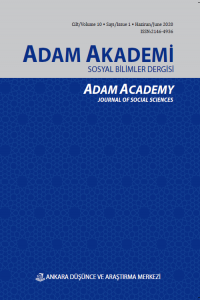Türkiye’deki Üniversitelerde Öğrenim Gören Suriyeli Öğrencilerin Sosyo-Ekonomik ve Sosyo-Kültürel Profillerinin Analizi
Abstract
Supporting Institution
TÜBİTAK
References
- ADIGÜZEL, Yusuf (2019). Göç Sosyolojisi, Ankara: Nobel Yayın Dağıtım. CASTLES, S. ve Millet J. M. (2008), Göçler Çağı – Modern Dünyada Uluslararası Göç Hareketleri, (Çev. B. Uğur Bal ve İ. Akbulut), İstanbul Bilgi Üniversitesi, İstanbul. CHAMBERS, Iain (2014). Göç, Kültür ve Kimlik, (çev: Mehmet Beşikçi ve İsmail Türkmen), İstanbul: Ayrıntı Yayınları. KAYA, Ayhan ve Diğerleri (2009), Türkiye’de İç Göçler Bütünleşme mi Geri Dönüş mü?- İstanbul Diyarbakır Mersin, İstanbul Bilgi Üniversitesi Yayınları, İstanbul. KYMLICKA, Will (2015). Çokkültürlü Yurttaşlık Azınlık Haklarının Liberal Teorisi, (çev:Abdullah Yılmaz), İstanbul: Ayrıntı Yayınları. LEE, E. S. (1966), “A Theory of Migration”, Demography, Vol. 3, No:1, p.42-57.MEB (2013), “Ülkemizde Geçici Koruma Altında Bulunan Suriye Vatandaşlarına Yönelik Eğitim Öğretim Hizmetleri Genelgesi”, http://fethiye.meb.gov.tr/meb_iys_dosyalar/2013_10/02093016_scannedimage24.pdf, (12.09.2016). SAĞIR, Adem ve DİKİCİ, Erkan (2011). “Yeni Göçmenlik Mekanları Olarak Yeni Kurulan Üniversiteler: Ordu Üniversitesi Örneğinde Öğrencilerin Bütünleşme Sorunları”, ODÜ Sosyal Bilimler Enstitüsü Sosyal Bilimler Araştırmaları Dergisi, Cilt 2, Sayı:3, ss.217-251.UNHCR (2014), “Global Trends, Mid-Year Trends Report. The UM Refugee Agency”, http://unhcr.org/540091d89.html, (21.02.2016).
Analysis on the Socio-Economical and Socio-Cultural Profiles of Syrian Students who Receive Education at the Universities in Turkey
Abstract
Migrations following the events in Syria in 2011 caused emergence of various discussion social, cultural and economic fields in Turkey. In this study, which focused on the phenomenon of education as a cultural encountering after migration, the main starting point is the university and higher education system. It is observed that the universities have turned into a new cultural encountering area with the coming of Syrians. This process goes with the internationalization of universities in Turkey. This study focused on the analysis of Syrian college students in the system of postgraduate and their socio-economical and socio-cultural profiles. In the study, the qualitative and quantitative designs were used together. In the research population, the scale which was developed by the researchers was used in the universities where the Syrian students are available. The survey was applied to 825 persons in Gaziantep University, Istanbul University, Karabuk University, Mersin University and Kahramanmaras Sutcu Imam University with the snowball method. The main reason why the universities were preferred is that they were in the top five of the numerical order for Syrian college students that the Higher Education Council declared. The semi-structured interview Form which consists of 7 main framework questions was made with 8 participants in the sampling of Karabuk University. Firstly, the internationalization of postgraduate in Turkey was discussed. Then, Syrian students were focused as the framework of postgraduate internationalization and the data which was obtained with the quantitative/ qualitative model was analysed sociologically. In the study it was observed that the belonging of Syrian students with their own groups was important. Also, it has been determined that social media is used as an important tool maintain these belongings. While the main problems related to communication problems for the students, it was noted that Syrian students find successful university education in Turkey.
References
- ADIGÜZEL, Yusuf (2019). Göç Sosyolojisi, Ankara: Nobel Yayın Dağıtım. CASTLES, S. ve Millet J. M. (2008), Göçler Çağı – Modern Dünyada Uluslararası Göç Hareketleri, (Çev. B. Uğur Bal ve İ. Akbulut), İstanbul Bilgi Üniversitesi, İstanbul. CHAMBERS, Iain (2014). Göç, Kültür ve Kimlik, (çev: Mehmet Beşikçi ve İsmail Türkmen), İstanbul: Ayrıntı Yayınları. KAYA, Ayhan ve Diğerleri (2009), Türkiye’de İç Göçler Bütünleşme mi Geri Dönüş mü?- İstanbul Diyarbakır Mersin, İstanbul Bilgi Üniversitesi Yayınları, İstanbul. KYMLICKA, Will (2015). Çokkültürlü Yurttaşlık Azınlık Haklarının Liberal Teorisi, (çev:Abdullah Yılmaz), İstanbul: Ayrıntı Yayınları. LEE, E. S. (1966), “A Theory of Migration”, Demography, Vol. 3, No:1, p.42-57.MEB (2013), “Ülkemizde Geçici Koruma Altında Bulunan Suriye Vatandaşlarına Yönelik Eğitim Öğretim Hizmetleri Genelgesi”, http://fethiye.meb.gov.tr/meb_iys_dosyalar/2013_10/02093016_scannedimage24.pdf, (12.09.2016). SAĞIR, Adem ve DİKİCİ, Erkan (2011). “Yeni Göçmenlik Mekanları Olarak Yeni Kurulan Üniversiteler: Ordu Üniversitesi Örneğinde Öğrencilerin Bütünleşme Sorunları”, ODÜ Sosyal Bilimler Enstitüsü Sosyal Bilimler Araştırmaları Dergisi, Cilt 2, Sayı:3, ss.217-251.UNHCR (2014), “Global Trends, Mid-Year Trends Report. The UM Refugee Agency”, http://unhcr.org/540091d89.html, (21.02.2016).
Details
| Primary Language | Turkish |
|---|---|
| Journal Section | Articles |
| Authors | |
| Publication Date | June 30, 2020 |
| Submission Date | July 29, 2019 |
| Published in Issue | Year 2020 Volume: 10 Issue: 1 |
Cited By
Syrian students in Turkish higher education: A systematic review and thematic synthesis
International Journal of Educational Research Open
https://doi.org/10.1016/j.ijedro.2024.100416
All articles published on ADAM ACADEMY are licensed under the Creative Commons Attribution 4.0 International License. This license grants you the right to reproduce, share and disseminate data mining applications, search engines, websites, blogs and all other platforms, provided that all published articles, data sets, graphics and attachments are cited. Open access is an approach that facilitates interdisciplinary communication and encourages different disciplines to work with each other.
ADAM ACADEMY provides added value to its field by offering more access and more transparent evaluation process to its articles in this direction.


